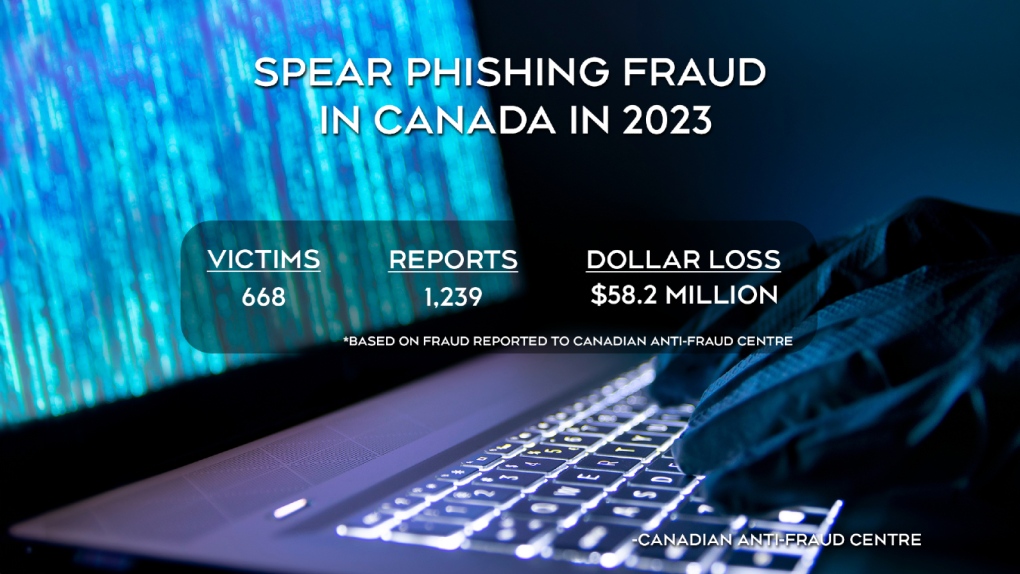How police, U.S. secret service helped an Ont. business being scammed out of $615K
Earlier this month, a business in the Toronto area fell for a spear phishing scam nearly losing more than $615,000, police say.
Thanks to some quick action, the $615,820 wire transfer sent from a Mississauga company to a U.S. bank was intercepted and frozen before fraudsters could get their hands on it, Ontario Provincial Police said in a news release Monday.
OPP received a call Feb. 2 from the Canadian Anti-Fraud Centre (CAFC) after it received a complaint about a spear phishing fraud, which happens when business emails are compromised.
The United States Secret Service was contacted which then alerted the U.S. financial institution.
"As a result of the timely reporting to the CAFC and the quick action of the members from each organization, the business is well-positioned to recover the funds," OPP said.
- Download the CTV News app now
- Get local breaking news alerts
- Daily newsletter with the top local stories emailed to your inbox
How spear phishing works
In a spear phishing scam, "fraudsters send messages to a targeted business or individual’s email account, often to the accounts payable department."
"Fraudsters will create an email address similar to the targeted company’s email address in order to appear as though the email is originating from a trusted source (a supplier or contractor)," OPP said.
"The fraudster will request an urgent payment to an alternate bank account for an invoice that is due."
Scammers may also send harmful malware software.
"If an employee clicks on it, a rule will be created to send copies of incoming emails to one of the fraudster’s email accounts," police said.
"Fraudsters will take their time to collect information, study the language on their intended targets and look for important contacts, payments and dates so they can send convincing emails from a seemingly trusted source. Fraudsters launch their attack when an accounts payable invoice has been identified."
Tips to protect yourself from spear phishing:
- Complete cyber and fraud training
- Avoid opening unsolicited emails or clicking on suspicious links or attachments
- Hover your mouse over an email address or link to confirm they are from someone you know and are correct
- Restrict sharing information publicly, including on social media
- Create detailed payment procedures including verbal authentication for any urgent requests or changes in payment details
- Verify unusual requests
- Upgrade and update technical security software
- Establish procedures for identifying, managing and reporting suspected fraud
"If you become a victim of a fraud or know someone who has, contact your local police service to report the crime and report it to the CAFC at 1-888-495-8501 or online on the Fraud Reporting System (FRS), even if a financial loss did not occur," OPP said.
Recent attacks
 Canadians lost more than $58 million in the 1,239 spear phishing fraud cases reported to the Canadian Anti-Fraud Centre in 2023. (CTV News Northern Ontario)Laurentian University is continuing to recover from a cyber incident on Feb. 18 that resulted in all IT systems being shutdown.
Canadians lost more than $58 million in the 1,239 spear phishing fraud cases reported to the Canadian Anti-Fraud Centre in 2023. (CTV News Northern Ontario)Laurentian University is continuing to recover from a cyber incident on Feb. 18 that resulted in all IT systems being shutdown.
Last month, fraudsters hacked a construction contractor's email and defrauded the City of Greater Sudbury out of $1.5 million.
CTVNews.ca Top Stories

opinion Tom Mulcair: Prime Minister Justin Trudeau's train wreck of a final act
In his latest column for CTVNews.ca, former NDP leader and political analyst Tom Mulcair puts a spotlight on the 'spectacular failure' of Prime Minister Justin Trudeau's final act on the political stage.
B.C. mayor gets calls from across Canada about 'crazy' plan to recruit doctors
A British Columbia community's "out-of-the-box" plan to ease its family doctor shortage by hiring physicians as city employees is sparking interest from across Canada, says Colwood Mayor Doug Kobayashi.
Two U.S. Navy pilots shot down over Red Sea in apparent 'friendly fire' incident, US military says
Two U.S. Navy pilots were shot down Sunday over the Red Sea in an apparent 'friendly fire' incident, the U.S military said, marking the most serious incident to threaten troops in over a year of America targeting Yemen's Houthi rebels.
'There’s no support': Domestic abuse survivor shares difficulties leaving her relationship
An Edmonton woman who tried to flee an abusive relationship ended up back where she started in part due to a lack of shelter space.
opinion King Charles' Christmas: Who's in and who's out this year?
Christmas 2024 is set to be a Christmas like no other for the Royal Family, says royal commentator Afua Hagan. King Charles III has initiated the most important and significant transformation of royal Christmas celebrations in decades.
Ottawa MP Mona Fortier appointed chief government whip
Ottawa-Vanier MP Mona Fortier has been appointed as chief government whip, the latest addition in a major reshuffle of Prime Minister Justin Trudeau's cabinet.
Can the Governor General do what Pierre Poilievre is asking? This expert says no
A historically difficult week for Prime Minister Justin Trudeau and his Liberal government ended with a renewed push from Conservative Leader Pierre Poilievre to topple this government – this time in the form a letter to the Governor General.
Baseball Hall of Famer Rickey Henderson dead at 65, reports say
Rickey Henderson, a Baseball Hall of Famer and Major League Baseball’s all-time stolen bases leader, is dead at 65, according to multiple reports.
Arizona third-grader saves choking friend
An Arizona third-grader is being recognized by his local fire department after saving a friend from choking.

































